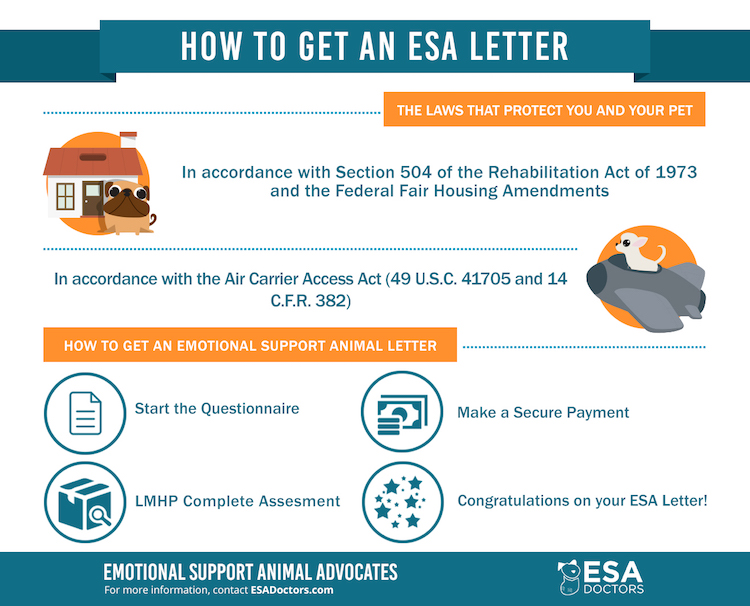In short, yes! You can qualify for an ESA letter prior to adopting a dog who will be your emotional support animal (ESA). An ESA letter is a recommendation letter from a licensed mental health professional (LMHP) for the handler, and not a “certification” for the specific animal. You may actually find it beneficial to qualify for an ESA letter before adopting an ESA. This way, you will have peace of mind knowing that your future pet will qualify as an ESA and be protected for housing and air travel. ESA owners frequently ask about the timing of ESA letter submissions to landlords, and this article is intended to clarify that process.

What Should an ESA Letter Contain?
A legitimate ESA letter will come from an LMHP and should state that you have a disability that qualifies you for an emotional support animal. The ESA letter may reference the type of ESA (dog, cat, miniature horse, bird, etc.) the LMHP is recommending, but will generally not have any specific details about the animal itself (name, breed, description, etc.).
ESA Tip: If you get your ESA letter online, make sure you are connected to a licensed mental health professional directly.
You should make sure your ESA letter:
- is on the licensed mental health professional’s official letterhead;
- has the LMHP’s signature and licensing information; and
- contains contact information that your landlord can use to verify the letter.
It is crucial that the landlord can verify that your letter came from an LMHP. The letter does not have to contain specific details about your ESA and its history. The ESA letter’s purpose is to establish that you have a disability and need for an ESA. It is very common for ESA handlers to obtain a recommendation for an ESA prior to adopting their pet.


Can My Landlord Ask About My Medical Condition?
ESA Tip: A landlord cannot ask about your medical history. They can only request an ESA letter.
Uninformed landlords will sometimes unreasonably ask for additional information about your condition. Specific details about your condition are purposefully not disclosed by the LMHP because that is confidential personal medical information.
Under the Fair Housing Act, while housing providers are allowed to ask for documentation of the disability-related need for the ESA, they cannot ask for personal medical details. The Department of Housing has clearly stated that a housing provider “may not ask an applicant or tenant to provide access to medical records or medical providers or provide detailed or extensive information or documentation of a person’s physical or mental impairments.”
When Should You Submit Your ESA Letter?
Tenants should always submit their ESA letter and request for accommodation to their housing provider as soon as possible. A landlord must approve an ESA before it is allowed to move in to a no-pets building. Landlords must respond to a tenant’s request promptly – the Department of Housing has stated that landlords cannot “unreasonably delay” a tenant’s request for reasonable accommodation. We always recommend submitting ESA paperwork as soon as possible and being fully transparent with your landlord. Many tenants fear reprisal from landlords who are averse to pets, but tenants are protected against discrimination by the Fair Housing Act which is federal law and applies to every State.
ESA Tip: ESA Registration is not required to live in a no-pets building. All you need is your ESA letter.
If your pet qualifies as an ESA, the landlord must allow it to live in your home even if there is a no-pets policy and cannot restrict your ESA because it is a certain breed, size or weight. The landlord is also not permitted to charge deposits or fees in connection with ESAs. However, until your pet is qualified as an ESA and accepted by your landlord, the building’s policies regarding normal pets will apply.

My Dog Lived With Me Before I Obtained My ESA Letter. What Are My Options?
This is a very common occurrence. You may have lived with your pet in a building that allowed for pets before your LMHP made a recommendation to qualify your animal as an ESA. In this scenario, the same process previously discussed would apply – you would submit your ESA letter to your landlord as soon as possible.
Note that once your pet qualifies as an ESA, it is no longer subject to the building’s normal rules regarding pets. The landlord is also not permitted to charge fees or deposits in connection with your ESA, so a tenant that previously paid fees or deposits prior to their animal being qualified for an ESA may be entitled to a refund.
Waiting for the landlord to respond to your request for accommodation can be a stressful time. As previously noted, the landlord must get back to you promptly and cannot “unreasonably delay” the process. While you wait for your landlord to respond, it is important to adhere to the building’s policies. If a building has a blanket restriction on pets, the tenant should consider housing their ESA somewhere else in the meantime, such as with a friend or family member. This is another reason why some tenants find it preferable to obtain an ESA letter prior to adopting their ESA.
Some tenants also express concern when they have been living in a no-pets building and now have to request reasonable accommodation for an ESA. This is another common occurrence – tenants will not always be aware they will need an ESA or have their ESA paperwork in order prior to moving in. Life circumstances change and it is not always possible to predict when a tenant will need an ESA or when they may qualify for one. Landlords must consider and reasonably accommodate valid ESAs even though the possibility of an ESA may not have been disclosed at the time the tenant moved in.

What if the Landlord Doesn’t Accept My ESA Letter?
A landlord can only reject an ESA in limited circumstances, including if they determine the specific ESA in question poses a direct threat to the health and safety of others. A landlord may also reject an ESA if accommodating the ESA would create an undue financial burden on the landlord or cause a fundamental alteration to the premises. The landlord should give you the specific reasons they are rejecting your ESA, and those reasons must be one of the valid exceptions allowed under the Fair Housing Act.
As previously discussed, landlords can verify your letter with your LMHP but they cannot ask for detailed information about a tenant’s physical or mental impairments. If you feel that your landlord is making additional demands that are unreasonable or their reasons for rejecting your ESA are not consistent with the Fair Housing Act, then as a last resort you can consider filing a complaint with the Department of Housing and Urban Development. We always recommend however trying to have an open and constructive dialogue with your landlord about your need for an ESA prior to filing a formal complaint.
Need a Legitimate ESA Letter?
Get the Love and Support you deserve!







You can obtain an ESA letter before or after adopting the animal. If you need to be connected with a licensed healthcare professional that can write ESA letters we can help you here: https://esadoctors.com/esa-questionnaire/
Would fostering dogs qualify under my ESA? Or is only one dog allowed under an ESA?
Typically an ESA is the owner’s everyday animal companion.
Are ESA allowed in Public areas such as Supermarkets etc?
No, ESAs are not ADA service dogs. They do not have the same broad public access rights. You can read more about how ESAs work here: https://esadoctors.com/how-it-works/
I currently live with an ESD who I just found out has cancer and is expected to live 1-2 more months. Once she passes, I am considering becoming a puppy raiser for Guide Dogs for the Blind where I would get a new dog every year or so. Does the ESA letter cover foster dogs? Is my landlord required to accept the new puppy?
If the foster dog is legitimately acting as your emotional support animal, then it may be covered if you have a recommendation letter from a licensed healthcare professional.
My personal LMHP, who I have been working with for a few years now, is writing a letter for me. Are there any other documents I need to present to my landlord?
A valid ESA letter from an LMHP should be all you need.
They should but too often they do not have obedience training. Some sre anniying barkers and some are not trained to behave around other animals. This should be required before they “qualify.”
We always recommend that ESA owners train their ESAs to be properly behaved in all settings and to socialize their animals appropriately.
Is this a legit site ? I want to register for an ESA letter and I want to make sure I am using the right and legal source to proceed with this registration. I appreciate the assistance and your time. Thank you
We are 100% legit! You can find reviews from actual clients here: https://www.shopperapproved.com/reviews/esadoctors.com/
We are also BBB Accredited. We have thousands of happy clients who are thrilled with our service!
You should be discussing the training that makes the animal a good companion and traveler as well as legitimate care of such an animal. I see people all the time with dogs that have had hair, nails or teeth cared for properly and that don’t behave.
Training in relation to the disability is not required for ESAs, but we agree that all ESAs should undergo basic training and of course be properly cared for.